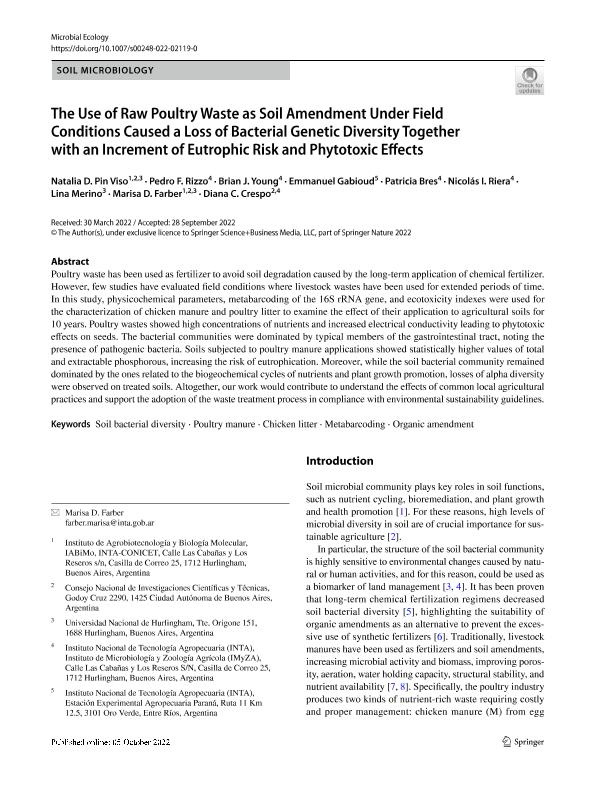Mostrar el registro sencillo del ítem
dc.contributor.author
Pin Viso, Natalia Daniela

dc.contributor.author
Rizzo, Pedro Federico

dc.contributor.author
Young, Brian Jonathan

dc.contributor.author
Gabioud, Emmanuel Adrián

dc.contributor.author
Bres, Patricia

dc.contributor.author
Riera, Nicolás I.
dc.contributor.author
Merino, Lina
dc.contributor.author
Farber, Marisa Diana

dc.contributor.author
Crespo, Diana C.
dc.date.available
2023-10-06T17:25:06Z
dc.date.issued
2022-10
dc.identifier.citation
Pin Viso, Natalia Daniela; Rizzo, Pedro Federico; Young, Brian Jonathan; Gabioud, Emmanuel Adrián; Bres, Patricia; et al.; The Use of Raw Poultry Waste as Soil Amendment Under Field Conditions Caused a Loss of Bacterial Genetic Diversity Together with an Increment of Eutrophic Risk and Phytotoxic Effects; Springer; Microbial Ecology; 86; 2; 10-2022; 1082-1095
dc.identifier.issn
0095-3628
dc.identifier.uri
http://hdl.handle.net/11336/214402
dc.description.abstract
Poultry waste has been used as fertilizer to avoid soil degradation caused by the long-term application of chemical fertilizer. However, few studies have evaluated field conditions where livestock wastes have been used for extended periods of time. In this study, physicochemical parameters, metabarcoding of the 16S rRNA gene, and ecotoxicity indexes were used for the characterization of chicken manure and poultry litter to examine the effect of their application to agricultural soils for 10 years. Poultry wastes showed high concentrations of nutrients and increased electrical conductivity leading to phytotoxic effects on seeds. The bacterial communities were dominated by typical members of the gastrointestinal tract, noting the presence of pathogenic bacteria. Soils subjected to poultry manure applications showed statistically higher values of total and extractable phosphorous, increasing the risk of eutrophication. Moreover, while the soil bacterial community remained dominated by the ones related to the biogeochemical cycles of nutrients and plant growth promotion, losses of alpha diversity were observed on treated soils. Altogether, our work would contribute to understand the effects of common local agricultural practices and support the adoption of the waste treatment process in compliance with environmental sustainability guidelines.
dc.format
application/pdf
dc.language.iso
eng
dc.publisher
Springer

dc.rights
info:eu-repo/semantics/openAccess
dc.rights.uri
https://creativecommons.org/licenses/by-nc-sa/2.5/ar/
dc.subject
CHICKEN LITTER
dc.subject
METABARCODING
dc.subject
ORGANIC AMENDMENT
dc.subject
POULTRY MANURE
dc.subject
SOIL BACTERIAL DIVERSITY
dc.subject.classification
Ciencias Medioambientales

dc.subject.classification
Ciencias de la Tierra y relacionadas con el Medio Ambiente

dc.subject.classification
CIENCIAS NATURALES Y EXACTAS

dc.title
The Use of Raw Poultry Waste as Soil Amendment Under Field Conditions Caused a Loss of Bacterial Genetic Diversity Together with an Increment of Eutrophic Risk and Phytotoxic Effects
dc.type
info:eu-repo/semantics/article
dc.type
info:ar-repo/semantics/artículo
dc.type
info:eu-repo/semantics/publishedVersion
dc.date.updated
2023-07-08T00:20:41Z
dc.journal.volume
86
dc.journal.number
2
dc.journal.pagination
1082-1095
dc.journal.pais
Alemania

dc.journal.ciudad
Berlin
dc.description.fil
Fil: Pin Viso, Natalia Daniela. Instituto Nacional de Tecnología Agropecuaria. Centro de Investigación en Ciencias Veterinarias y Agronómicas. Instituto de Agrobiotecnología y Biología Molecular. Consejo Nacional de Investigaciones Científicas y Técnicas. Oficina de Coordinación Administrativa Parque Centenario. Instituto de Agrobiotecnología y Biología Molecular; Argentina
dc.description.fil
Fil: Rizzo, Pedro Federico. Instituto Nacional de Tecnología Agropecuaria. Centro de Investigación en Ciencias Veterinarias y Agronómicas. Instituto de Microbiología y Zoología Agrícola; Argentina
dc.description.fil
Fil: Young, Brian Jonathan. Instituto Nacional de Tecnología Agropecuaria. Centro de Investigación en Ciencias Veterinarias y Agronómicas. Instituto de Microbiología y Zoología Agrícola; Argentina
dc.description.fil
Fil: Gabioud, Emmanuel Adrián. Instituto Nacional de Tecnología Agropecuaria. Centro Regional Buenos Aires; Argentina
dc.description.fil
Fil: Bres, Patricia. Instituto Nacional de Tecnología Agropecuaria. Centro de Investigación en Ciencias Veterinarias y Agronómicas. Instituto de Microbiología y Zoología Agrícola; Argentina
dc.description.fil
Fil: Riera, Nicolás I.. Instituto Nacional de Tecnología Agropecuaria. Centro de Investigación en Ciencias Veterinarias y Agronómicas. Instituto de Microbiología y Zoología Agrícola; Argentina
dc.description.fil
Fil: Merino, Lina. Universidad Nacional de Hurlingham; Argentina
dc.description.fil
Fil: Farber, Marisa Diana. Instituto Nacional de Tecnología Agropecuaria. Centro de Investigación en Ciencias Veterinarias y Agronómicas. Instituto de Agrobiotecnología y Biología Molecular. Consejo Nacional de Investigaciones Científicas y Técnicas. Oficina de Coordinación Administrativa Parque Centenario. Instituto de Agrobiotecnología y Biología Molecular; Argentina
dc.description.fil
Fil: Crespo, Diana C.. Instituto Nacional de Tecnología Agropecuaria. Centro de Investigación en Ciencias Veterinarias y Agronómicas. Instituto de Microbiología y Zoología Agrícola; Argentina
dc.journal.title
Microbial Ecology

dc.relation.alternativeid
info:eu-repo/semantics/altIdentifier/url/https://link.springer.com/10.1007/s00248-022-02119-0
dc.relation.alternativeid
info:eu-repo/semantics/altIdentifier/doi/http://dx.doi.org/10.1007/s00248-022-02119-0
Archivos asociados
